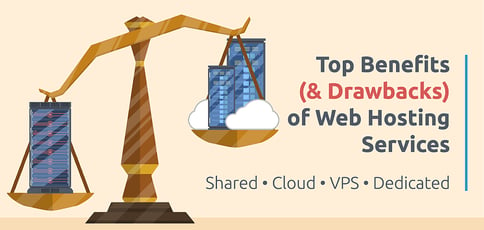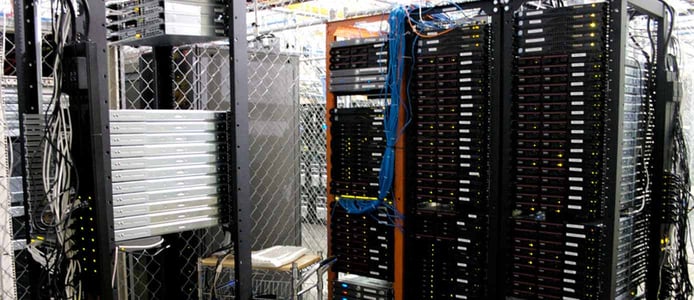
With the ability to broadcast your brand or message to millions of readers and potential customers all around the world, the benefits of web hosting services are tantalizing — but the hassles of setting up that website can make you question whether the attention is worth it at all.
Getting started with exactly the right hosting plan is like finding the perfect pair of pants — a close tailored fit that’s comfortable but leaves some room for growth. You want to find a great deal without spending a ton of time shopping, trying things on, and possibly having to return them.
A hosting plan that’s too big will tax your budget and sanity, while something too small negatively affects your site’s ability to grow and perform as designed. Let’s walk through the various benefits of web hosting services, along with the downfalls that might affect your decision.
Benefits & Drawbacks of “Shared” Hosting
Most site owners enter the world of web hosting by signing up for a shared hosting plan. At this level, hundreds or even thousands of customers share the storage space and computing resources of one server. The ultra-popular service is particularly welcoming to beginners and small businesses because of its high levels of customer support, easy-to-use tools, and comprehensive options.
Shared hosting providers take care of all the technical aspects of a website’s infrastructure, handling infrastructure security, updates, and other maintenance. Customers just have to focus on building an online presence representative of their brand or business goals, as most basic shared hosting plans include a free domain name registration, unlimited email accounts, eCommerce functionality, a drag-and-drop website builder, and hundreds of one-click installations for popular software programs like WordPress, Joomla, and Drupal.
Because so many websites exist on the same server, there is a shared responsibility for security and stability. Neighboring websites can negatively affect a server’s performance or availability by requiring an unfair share of processing power, sending spam, or falling victim to a security vulnerability.
BENEFITS:
- Supremely affordable prices
- Easy for beginners to learn and manage
- Tons of free add-on services
DRAWBACKS:
- Limited resources
- Less control over security and performance
Despite the disadvantages of shared hosting, the service remains a top-notch introduction to website design and management. The full range of customers, from experienced developers to first-time bloggers, can excel in a shared hosting environment. These plans work well for professional portfolios, small business websites, online stores, personal blogs, and much more.
When looking for a shared hosting provider, keep an eye out for unlimited resources like storage, bandwidth, databases, and emails. Perks like free SSL certificates and access to a content delivery network or website builder further secure your site, help it load faster, and look more visually appealing. We’ve reviewed and listed our three favorite shared hosting providers below, showcasing their upgraded infrastructure, personable support, and supreme affordability. Click on a review to learn more about how a particular host can meet your website’s needs.
1. InMotionHosting.com
- High-quality hosting, no matter the format
- FREE SSD storage packs 20x the performance
- FREE SSL certificate and 24/7 support
- 1-click installs for WordPress and popular CMSes
- Get started with FREE website transfer service
- Get started on InMotion Hosting now.
SHARED
RATING
★★★★★
Our Review
InMotion Hosting offers an excellent business-class shared hosting plan — with a price tag lower than several other budget hosts. For the IT crowd in the audience, you’ll appreciate SSH access, as well as support for PHP, Ruby, Perl, Python, WP-CLI, and other popular languages. Go to full review »
| Money Back Guarantee | Disk Space | Domain Name | Setup Time |
|---|---|---|---|
| 90 days | 100 GB SSD - Unlimited SSD | FREE (1 year) | 5 minutes |
2. HostGator.com
- Get 74% off monthly pricing
- A perfect blend of price and performance
- Intuitive control panel with 1-click CMS installs
- Unlimited everything — from domains to databases
- Around-the-clock expert support
- Get started on HostGator now.
SHARED
RATING
★★★★★
Our Review
HostGator is a great compromise between performance and price. The company offers unlimited emails, MySQL databases, disk space, and bandwidth, plus one-click installs of popular open-source projects, in addition to a 99. Go to full review »
| Money Back Guarantee | Disk Space | Domain Name | Setup Time |
|---|---|---|---|
| 30 days | 10 GB SSD - 40 GB SSD | FREE (1 year) | 4 minutes |
3. SiteGround.com
- FREE CDN, email, and daily backups
- Hassle-free website and email migrations
- Unlimited traffic, databases, and email
- Industry-leading customer support response times
- HostingAdvice readers get 86% off
- Get started on SiteGround now.
SHARED
RATING
★★★★★
Our Review
Providing hosting with the perfect balance of technological innovation and superior customer support, SiteGround offers a range of affordable hosting services to meet your needs. In addition to the expected cheap web hosting perks — a free website builder and unlimited bandwidth — the company specializes in custom-built tools to deliver strong and positive user experiences. Go to full review »
| Money Back Guarantee | Disk Space | Domain Name | Setup Time |
|---|---|---|---|
| 30 days | 10 GB SSD - 40 GB SSD | New or Transfer | 6 minutes |
Benefits & Drawbacks of “Cloud” Hosting
As your site gains traction and builds a following, be ready to upgrade to a new service — don’t be the shared hosting consumer whose successful website overwhelms the server and affects fellow customers. Fortunately, most providers will happily transfer your website and files to higher-tier plans that add more storage space, bandwidth, and fine-tuned control. Graduates of shared web hosting typically have two options — cloud or virtual private server hosting — both of which introduce a concept called virtualization.
With cloud hosting, your website files will be spread across a network of multiple servers. With so many servers sharing the workload, your site will load quickly no matter the traffic. Computing resources quickly scale up and down to adapt to the ebb and flow of visitors, and the redundant hardware means your site won’t go down if one server crashes.

Cloud hosting, where many servers share the workload, boasts high levels of redundancy and scalability.
However, as you scale the web hosting ranks, more and more is expected of the website owner. While customers can frequently purchase managed services where the provider takes care of basic hardware and security maintenance, they have more control in how their site functions and responds to various scenarios.
BENEFITS:
- Automatic and scalable resource allocation
- Improved performance and reliability
- Pay-as-you-go price structure
DRAWBACKS:
- More complicated management
- Costs can be harder to predict
Cloud hosting can take a variety of forms, from the fairly simple and pain-free services, like the ones we’ve laid out below, to the more complicated platforms available through Amazon Web Services, Microsoft Azure, and Google Cloud Platform. Whichever route you take depends on your traffic, goals, technical experience, and budget.
Larger businesses with experienced developers or system administrators will do well with AWS, but we tend to recommend most organizations ease the transition from shared hosting by finding a cloud hosting provider that retains some of the user-friendly features of the shared hosting ranks. The companies listed below give site owners the scalability and flexibility of the cloud while streamlining the tedious and technical processes of configuration, deployment, and management.
4. Kamatera.com
- Ultimate scalability with limitless customizations
- Create and deploy servers in 60 seconds
- Easily add load balancers and firewalls
- Stellar 99.95% uptime guarantee
- Sign up today for a 30-day FREE trial
- Get started on Kamatera now.
CLOUD
RATING
★★★★★
Our Review
Starting with more than 60 operating system images to choose from, Kamatera is a strong option for developers who know exactly what environment works best for their project. Customize your cloud server as needed and deploy in less than a minute. Go to full review »
| Setup Time | Disk Space | CPU | RAM |
|---|---|---|---|
| 5 minutes | 20 GB SSD - 4 TB SSD | 1 - 32 cores | 1 GB - 128 GB |
5. IONOS.com
- Start with $100 in credit for your first month
- Auto scaling with premium Intel processors
- Customized operating systems (Linux or Windows)
- Deploy Linux instances in less than 1 minute
- Transparent costs and by-the-minute billing
- Get started on 1&1 IONOS now.
CLOUD
RATING
★★★★★
Our Review
Boasting 99. 998% platform availability, the popular cloud hosting services from 1&1 IONOS deploy more than 2,500 virtual machines each week. Go to full review »
| Setup Time | Disk Space | CPU | RAM |
|---|---|---|---|
| 6 minutes | 10 GB NVMe - 640 GB NVMe | 1 - 24 cores | 512 MB.- 48 GB |
6. Cloudways.com
- Managed cloud hosting with 24/7/365 monitoring
- Choose from 5 popular cloud providers
- Auto-healing cloud servers with FREE backups
- 3-day free trial with no credit card required
- Host unlimited apps with no contract lock-in
- Get started on Cloudways now.
CLOUD
RATING
★★★★★
Our Review
If you can’t beat the cloud provider behemoths, offer their infrastructure as a service. Cloudways gives customers their choice of cloud platform: AWS, Google, Linode, Digital Ocean, or Vultr. Go to full review »
| Setup Time | Disk Space | CPU | RAM |
|---|---|---|---|
| 8 minutes | 20 GB SSD - 4 TB SSD | 1 - 96 cores | 1 GB - 384 GB |
Benefits & Drawbacks of “VPS” Hosting
While cloud hosting represents a smaller step up from shared web hosting, virtual private servers are commonly viewed as the most effective bridge between shared hosting and dedicated servers. Instead of splitting a server with thousands of other site owners (or footing the massive bill to own the whole server), virtual private server resources are distributed to just a few dozen customers.
Although VPS customers share the same underlying hardware, a layer of virtualization effectively creates separate machines capable of running their own operating system. That means users have the ultimate control, otherwise known as root access, over the software programs and security configurations powering their site. Computing resources are dedicated to each virtual machine, meaning you’ll be able to count on a specific amount of storage space and bandwidth to deliver your site.

Managed services, where a host helps maintain and update the environment, are a key asset to many VPS plans.
What’s more, you can add or remove processing power to scale to your site’s audience. With great power, however, comes great responsibility. Given the infrastructure, VPS configurations aren’t as instantly scalable as cloud hosting. Although root access enables experienced users to craft the environment to exactly match their performance, security, and reliability goals, those who don’t have the technical chops can quickly find themselves in a world of hurt.
BENEFITS:
- Complete control over your environment
- Dedicated resources at a decent price
- Fine-tuned performance and security
- Managed services cover the technical stuff
DRAWBACKS:
- More upkeep and maintenance required
- Can get costly with managed services
- Still at the mercy of a shared server
Fortunately, many VPS providers give customers the option of employing their own server technicians to manage the tedious aspects of virtual servers, such as operating system updates and security patches. Usually for an added fee, managed services enable you to focus on building the website or online store of your dreams without getting bogged down in software installations or the command line interface.
When looking for top-notch VPS hosting, be sure to find a host that provides strong hardware to power those dedicated resources. Solid-state drives, or SSDs, for instance, read and write data up to 20 times faster than traditional hard disk drives. The providers below are our favorites for VPS hosting and perfectly pair high-performance computing with a wide range of software options and helpful support to make the transition to VPS hosting a breeze.
7. Hostinger.com
- Cloud-based SSD storage for speed and reliability
- Double your RAM with burst periods
- FREE dedicated IPv4 and IPv6 addresses
- Custom control panel for reboots and OS installs
- HostingAdvice readers enjoy more than 50% off
- Get started on Hostinger now.
VPS
RATING
★★★★★
Our Review
Hostinger's laser focus on providing affordable hosting solutions shines brightest with the company's VPS packages. The company provides six different virtual server plans, including one that costs less than $5. Go to full review »
| Setup Time | Disk Space | CPU | RAM |
|---|---|---|---|
| 6 minutes | 50 GB NVMe - 400 GB NVMe | 1 - 8 cores | 4 GB - 32 GB |
8. Kamatera.com
- Cloud VPS that's more flexible and affordable
- Load balancer, firewall, and managed services
- Premium Intel CPUs with 300% more power
- Choose between monthly or hourly billing
- Sign up today for a 30-day FREE trial
- Get started on Kamatera now.
VPS
RATING
★★★★★
Our Review
Backed by cutting-edge cloud computing technology, Kamatera adds instant and limitless scalability to the VPS hosting marketplace. Each cloud or virtual server is equipped with blazing-fast SSD storage and Intel Xeon Platinum CPUs. Go to full review »
| Setup Time | Disk Space | CPU | RAM |
|---|---|---|---|
| 5 minutes | 20 GB SSD - 4 TB SSD | 1 - 32 cores | 1 GB - 128 GB |
9. A2Hosting.com
- Turbo server & cache options for faster page loads
- Well-built plans starting with 4GB RAM
- FREE CDN plus auto-installs with Softaculous
- Multilingual support and up to unlimited databases
- Enhanced security with and daily kernel updates
- Get started on A2 Hosting now.
VPS
RATING
★★★★★
Our Review
While A2 Hosting's turbocharged shared hosting platform gives site owners ample room to grow, the company's tech prowess is on full display with its portfolio of VPS options. Ranging from unmanaged, bare-metal environments to stress-free, fully managed space, A2 Hosting is sure to have the perfect option for your expanding online presence. Go to full review »
| Setup Time | Disk Space | CPU | RAM |
|---|---|---|---|
| 7 minutes | 20 GB SSD - 450 GB SSD | 1 - 10 cores | 1 GB - 32 GB |
Benefits & Drawbacks of “Dedicated Server” Hosting
Even though VPS customers enjoy dedicated resources, they can still be affected by noisy neighbors that impact the physical server via spam, exposed security vulnerabilities, or an overarch of allocated resources. For those who don’t like to share, dedicated servers reside at the top of the web hosting heap.
A dedicated server is exactly what it sounds like — a single server completely devoted to one website or application. That means 100% control over the bandwidth, storage space, and IP address, plus all the components related to security, performance, reliability, and software. As a result, dedicated servers represent the crème de la crème of hosting services. Site owners or application developers can perfectly configure the machine specifically to their exact requirements and specifications.

Dedicated servers give site owners the freedom to configure and secure their environment to their exact requirements.
Naturally, having an entire machine to yourself comes with a hefty price tag (although cheap dedicated servers do exist). And all the responsibility of configuring and maintaining the associated server components requires a good deal of experience. Similar to VPS hosting, you can likely pay for managed services to help manage the workload, but that added expense may be enough to finally break the budget.
BENEFITS:
- Exclusive access to server resources
- Better security, performance, and reliability
- Unlimited customizations and control
DRAWBACKS:
- The most expensive hosting option
- Technical experience required
Despite the cost and potential headaches of server management, dedicated hosting still beats hosting your own website. You get to leverage your hosting provider’s redundant power supplies and global networks, along with around-the-clock customer support. What’s more, many hosts will help you with basic server setup and maintenance, and easily add other support services.
While you examine dedicated server hosts, pay attention to both the hardware configurations and added services like migrations, backups, monitoring, and support. Since you’ll have an entire machine to yourself, you’ll want the entire infrastructure to modernize your organization’s online presence and deliver cutting-edge performance, security, and reliability. Check out our three favorite providers below and click on the reviews to learn more.
10. InMotionHosting.com
- Bare-metal or managed servers available
- 1-on-1 time with a server administrator
- 99.99% uptime via Smart Routing™ technology
- Tier 1 network with redundant bandwidth
- SSH root access and DDoS protection on all servers
- Upgrade for cPanel, migration, and auto backups
- Get started on InMotion now.
DEDICATED
RATING
★★★★★
Our Review
InMotion Hosting offers amazingly fast and reliable dedicated hosting on market-leading hardware — making it an easy choice for anyone seeking a premium dedicated server host. From free SSDs to a fanatical support team, InMotion has all the bases covered for both small-scale and large-scale operations. Go to full review »
| Setup Time | Disk Space | CPU | RAM |
|---|---|---|---|
| 7 minutes | 1 TB SSD - 3.2 TB SSD | 12 - 32 cores | 192 GB DDR4 - 512 GB DDR4 |
11. IONOS.com
- Explore server deals to find the best rates
- High powered modern AMD and Intel processors
- Unlimited traffic and 1 Gbit/s network connectivity
- 8-minute deployment with full API control
- Auto backups, DDoS protection, and RAID-1 storage
- Get started on 1&1 IONOS now.
DEDICATED
RATING
★★★★★
Our Review
If you need blazing-fast speed, optimum uptime, top-notch flexibility, and full control over the fate of your website the dedicated servers from 1&1 IONOS have you covered. The company offers an assortment of entry-level, performance-focused, and business-class server options. Go to full review »
| Setup Time | Disk Space | CPU | RAM |
|---|---|---|---|
| 7 minutes | 480 GB SSD - 2 TB HDD | 2 - 32 cores | 12 GB - 256 GB |
12. LiquidWeb.com
- Linux or Windows with choice of 3 control panels
- 100% network and power uptime guarantees
- Custom configurations and instant provisioning
- Auto-migrations, backups, and real-time monitoring
- Block/object storage and load balancer add-ons
- Get started on Liquid Web now.
DEDICATED
RATING
★★★★★
Our Review
Liquid Web's strong suit is managed dedicated server hosting. The company owns and operates five state-of-the-art datacenters in the US and Europe works tirelessly to build and maintain custom solutions for added performance and security. Go to full review »
| Setup Time | Disk Space | CPU | RAM |
|---|---|---|---|
| 8 minutes | 480 GB SSD - 960 GB SSD (+ 2 TB SATA) | 4 - 16 cores | 16 GB - 64 GB |
See other top dedicated server hosts »
Take Advantage of Professional Web Hosting to Grow Your Business
Hopefully, by now you have a sense of the type of web hosting service that will work best for your website or online business. Understanding the type of server configuration (shared, cloud, virtual, or dedicated) is a huge first step, akin to knowing your pants size. Finding exactly the right provider and plan is more representative of finding the store, brand, or belt that makes the look just right.
Web hosting providers exist in a variety of fabrics, colors, and styles, so be sure to find a well-known and respected brand to deliver a mission-critical service like web hosting. By choosing a professional-grade host, you’re more likely to find the extra features and tools to make your experiences more enjoyable; who doesn’t like extra pockets?
Do you know how football is commonly described as a game of inches? Well, growing your business online in a crowded market of web hosting companies, is a game of milliseconds. According to Google, a half-second delay in loading search results in a 20% decrease in traffic, and page load times just 400 milliseconds slower can result in millions of abandoned sessions each month.
Hidden gems exist at every level of hosting configuration. Shared servers, for instance, should be well-rounded plans that provide everything you need to get started and grow. Cloud and VPS options need to have the scalability and access needed to hone performance and security, while dedicated server hosting plans rely on impressive network speeds. Each level of hosting comes with a variety of perks and disadvantages — which is most relevant to you?
HostingAdvice.com is a free online resource that offers valuable content and comparison services to users. To keep this resource 100% free, we receive compensation from many of the offers listed on the site. Along with key review factors, this compensation may impact how and where products appear across the site (including, for example, the order in which they appear). HostingAdvice.com does not include the entire universe of available offers. Editorial opinions expressed on the site are strictly our own and are not provided, endorsed, or approved by advertisers.
Our site is committed to publishing independent, accurate content guided by strict editorial guidelines. Before articles and reviews are published on our site, they undergo a thorough review process performed by a team of independent editors and subject-matter experts to ensure the content’s accuracy, timeliness, and impartiality. Our editorial team is separate and independent of our site’s advertisers, and the opinions they express on our site are their own. To read more about our team members and their editorial backgrounds, please visit our site’s About page.














